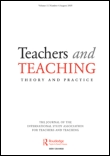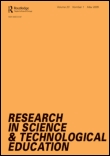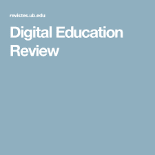
Technology Pedagogy and Education
Scope & Guideline
Empowering Educators through Technological Insights
Introduction
Aims and Scopes
- Integration of Technology in Pedagogy:
The journal emphasizes research on how technology can be effectively integrated into pedagogical practices, enhancing teaching and learning outcomes. - Innovative Educational Practices:
It explores innovative approaches to teaching using digital tools, including blended learning, flipped classrooms, and digital storytelling. - Teacher Preparation and Professional Development:
Research on preparing teachers to utilize technology in their classrooms, including studies on teacher training and ongoing professional development related to educational technology. - Impact of Digital Tools on Learning:
The journal examines the effects of various digital tools and platforms on student engagement, learning outcomes, and pedagogical effectiveness. - Critical Perspectives on Technology in Education:
It also addresses critical discourses surrounding technology use in education, including equity issues, digital literacy, and the socio-political implications of technology integration. - Research Methodologies in Educational Technology:
The journal publishes studies employing diverse research methodologies, including qualitative, quantitative, and mixed-method approaches to investigate technology use in educational contexts.
Trending and Emerging
- Artificial Intelligence in Education:
There is a growing focus on the role of artificial intelligence in educational settings, exploring how AI can assist in personalized learning and enhance teaching practices. - Collaborative and Interactive Learning:
Emerging themes emphasize collaborative learning environments facilitated by digital tools, with research investigating how technology can promote peer interaction and co-creation of knowledge. - Critical Approaches to Technology Integration:
An increasing number of studies are critically examining the implications of technology use in education, including issues of equity, access, and the socio-political dimensions of digital learning. - Hybrid and Blended Learning Models:
Research on hybrid and blended learning models is trending, particularly in the context of post-pandemic education, as educators seek effective ways to merge online and face-to-face learning. - Student-Centered Learning Approaches:
There is a notable shift towards student-centered learning approaches, with research focusing on how technology can empower students to take control of their learning processes and enhance engagement. - Impact of COVID-19 on Educational Practices:
Studies analyzing the impact of the COVID-19 pandemic on teaching and learning practices are emerging, providing insights into the rapid shifts towards online and remote education.
Declining or Waning
- Traditional Classroom Practices:
There has been a noticeable decline in research focusing solely on traditional classroom practices without the integration of technology, as the field shifts towards exploring more innovative and blended learning approaches. - General Digital Literacy:
While digital literacy remains important, the specific focus on general digital literacy skills is waning in favor of more context-specific studies that examine digital literacy in relation to specific subjects or technologies. - Basic ICT Training for Teachers:
Research specifically centered on basic ICT training for teachers is becoming less frequent, as the emphasis shifts towards comprehensive technology integration frameworks and advanced pedagogical strategies. - Single Technology Tools:
Studies focusing on the impact of single technology tools (e.g., one specific app or software) are decreasing, with a broader focus now on integrated technology systems and their pedagogical implications. - Technology Adoption Models:
There is a reduction in the number of studies based solely on traditional technology adoption models, as the discourse shifts towards understanding the complexities of technology integration and the contextual factors involved.
Similar Journals

Technology Knowledge and Learning
Exploring New Frontiers in Learning and TechnologyTechnology Knowledge and Learning, published by SPRINGER, stands as a pivotal platform in the realms of computational theory, computer science, education, and human-computer interaction. With an impressive impact factor reflecting its reputation, this journal has consistently ranked in the Q1 quartile across multiple categories as of 2023, including Computational Theory and Mathematics, Education, and Engineering. Spanning a timeline from 2011 to 2024, it serves as an essential resource for those engaged in exploring the intersections of technology, pedagogy, and knowledge transfer, thereby facilitating advancements in both theory and practical applications. Although it is not an open-access journal, the rigorous peer-review process ensures that only the highest quality research contributes to its esteemed reputation. By providing a platform for innovative research and discussions, Technology Knowledge and Learning plays a crucial role in shaping the future of technological education and applications, making it an invaluable resource for researchers, professionals, and students alike, seeking to stay at the forefront of this dynamic field.

GIST-Education and Learning Research Journal
Championing Open Access for Educational ExcellenceGIST-Education and Learning Research Journal, published by INST UNIV COLOMBO AMERICANA-UNICA, stands as a prominent vessel for the dissemination of scholarly research in the field of education and learning. Since its inception in 2007, this open access journal has championed the free exchange of knowledge, allowing researchers, educators, and students from around the globe to contribute to and benefit from the latest findings and practices in educational theory and methodology. With its commitment to enhancing educational practices and influencing policy through rigorous research, GIST-Education and Learning Research Journal invites submissions that explore innovative teaching strategies, learning technologies, educational psychology, and related fields. Its accessibility and dedication to quality research make it an invaluable resource for anyone invested in the improvement of educational outcomes.

Pegem Egitim ve Ogretim Dergisi
Empowering Educators with Cutting-Edge ResearchPegem Egitim ve Ogretim Dergisi is a prominent academic journal published by PEGEM AKAD YAYINCILIK EGITIM DANISMANLIK HIZMETLERI TIC LTD STI, specializing in the field of education. Based in Turkey, this journal offers a platform for scholarly discourse, catering to both emerging and established researchers in the educational domain. With its ISSN 2148-239X, the journal aims to provide insights into contemporary educational practices, pedagogical innovations, and research findings that influence teaching and learning. Although classified in the Q4 quartile of the education category as of 2022 and achieving a Scopus rank of 1178 out of 1469, it remains a valuable resource for practitioners and academics alike. The journal ceased Scopus coverage in 2023, yet it continues to be a relevant outlet for educational research in Turkey and beyond. While it operates under traditional access models, the potential for collaborative research and knowledge sharing makes it a noteworthy choice for those engaged in the evolving landscape of education.

Teachers and Teaching
Fostering Excellence in Teaching and LearningTeachers and Teaching is a premier scholarly journal published by Routledge Journals, Taylor & Francis Ltd, providing an essential platform for researchers, educators, and practitioners in the fields of Education and Arts and Humanities. With an editorial focus on the dynamics of teaching and learning, the journal aims to share innovative research and insightful discussions that enhance pedagogical practices and policy development. Notably, it has achieved a Q1 ranking in both the Arts and Humanities and Education categories, signifying its impact and relevance in educational research, as reflected in its Scopus rankings, with an 84th percentile for Arts and Humanities and a 76th percentile in Education. Although it does not offer open access, the journal provides extensive access options for libraries and institutions, making its rich content available to a wide audience. Spanning from 1995 to 2024, Teachers and Teaching continues to set the standard for high-quality scholarship in the evolving landscape of education, inviting contributions that explore challenges and innovations in teaching methodologies.

Computers and Education Open
Empowering educators with innovative insights.Computers and Education Open is a pioneering open access journal published by Elsevier that focuses on advancing the field of educational technology and digital learning methodologies. Since its inception in 2020, the journal has provided a platform for researchers, educators, and practitioners to disseminate innovative findings and share insights related to the integration of computing technologies in educational settings. With its ISSN 2666-5573, this journal aims to bridge the gap between technology and education, fostering a collaborative environment for those dedicated to enhancing learning experiences through computational tools. Leveraging the rigorous standards of Elsevier's publishing excellence, Computers and Education Open attracts high-quality research that influences pedagogical practices and educational policies globally. The open access nature of the journal ensures that valuable knowledge is freely accessible, making it an essential resource for academics and professionals looking to stay at the forefront of educational advancements.

Research in Science & Technological Education
Transforming Education Through Rigorous ResearchResearch in Science & Technological Education, published by Routledge Journals, Taylor & Francis Ltd, is a leading international journal dedicated to advancing the field of education within the realms of science and technology. With its ISSN 0263-5143 and E-ISSN 1470-1138, this prestigious journal provides a platform for innovative and rigorous research from 1983 to the present, thus offering critical insights into pedagogical practices, curriculum development, and policy-making. Boasting a remarkable impact, it ranks in the top quartile (Q1) in both Education and Multidisciplinary categories as of 2023, with an impressive Scopus ranking of #270 out of 1543 in Social Sciences _ Education, placing it in the 82nd percentile. Researchers, educators, and students will find invaluable resources and discussions that shape the future of science and technological education in an increasingly complex world. Although this journal does not offer Open Access, it maintains a strong commitment to disseminating high-quality research, making it an essential read for those invested in the evolution of educational practices and outcomes in the STEM fields.

Digital Education Review
Shaping the Future of Education with Digital InsightsDigital Education Review, published by the University of Barcelona, stands at the forefront of the Digital and Educational Technology field, offering a valuable platform for researchers, educators, and policymakers since its inception as an Open Access journal in 2010. With an emphasis on innovative practices and critical evaluations in digital education, the journal has garnered an impressive standing within the academic community, achieving rankings of Q3 in Computer Science Applications and Q2 in Education for 2023, alongside a notable position in the 71st percentile of Social Sciences - Education rank (447 out of 1543). The journal aims to foster interdisciplinary dialogue and disseminate research that influences educational transformation through digital means. Based in Spain, the Digital Education Review not only promotes high-quality research but also engages with a global audience, making it a pivotal resource for those dedicated to advancing the understanding of digital educational practices.

TECHNOLOGY IN SOCIETY
Illuminating the Societal Dimensions of Technological ChangeTechnology in Society, published by Elsevier Science Ltd, is a premier journal dedicated to exploring the interplay between technological advancements and their societal implications. With an ISSN of 0160-791X and an E-ISSN of 1879-3274, this journal has established itself as a pivotal resource since its inception in 1979. The journal's impact factor and its prestigious Q1 ranking in categories including Business and International Management, Education, Human Factors and Ergonomics, and Sociology and Political Science underscore its significance in fostering high-quality scholarship. The journal aims to publish articles that critically examine the multifaceted effects of technology on society, making it essential reading for academics, practitioners, and policy-makers alike. As it continues to evolve through 2024, Technology in Society remains committed to disseminating important research that drives understanding and dialogue in today’s technology-driven landscape.

Pixel-Bit- Revista de Medios y Educacion
Fostering Global Dialogue in Media and EducationPixel-Bit: Revista de Medios y Educación is an esteemed academic journal published by UNIV SEVILLA, EDITORIAL, dedicated to advancing the fields of media and education through rigorous research and insightful analysis. With its Open Access policy established in 2010, the journal ensures that the latest findings and methodologies are readily accessible to researchers, professionals, and students worldwide. Operating from Seville, Spain, Pixel-Bit has been recognized for its significant impact within its respective fields, achieving Q2 and Q3 rankings in multiple categories such as Computer Networks and Communications, Computer Science Applications, Education, and Information Systems as of 2023. Its Scopus rankings further reflect its influence, with notable placements in the 83rd percentile in Social Sciences - Education. This journal serves as a pivotal platform for disseminating knowledge, fostering innovative practices, and bridging the gap between technology and pedagogy in an increasingly digital world.

Contemporary Educational Technology
Transforming Teaching with Cutting-Edge TechContemporary Educational Technology is a premier journal published by BASTAS PUBL LTD - UK, specializing in the dynamic intersection of educational practices and technological advancements. With an E-ISSN of 1309-517X, this journal serves as a vital resource for researchers, educators, and professionals keen to explore innovative solutions and methodologies in education. Ranked in the Q2 category for both Education and Management of Technology and Innovation in 2023, Contemporary Educational Technology boasts impressive Scopus ranks, standing at #187 out of 1543 in the Social Sciences Education field, reflecting its influence and contribution to contemporary research. Through its open-access approach, this journal facilitates the dissemination of knowledge, making cutting-edge research readily available to a global audience. By examining developments from 2018 through 2024, it aims to critically analyze and promote the integration of technology in educational contexts, thereby fostering improved learning outcomes and innovative teaching practices.